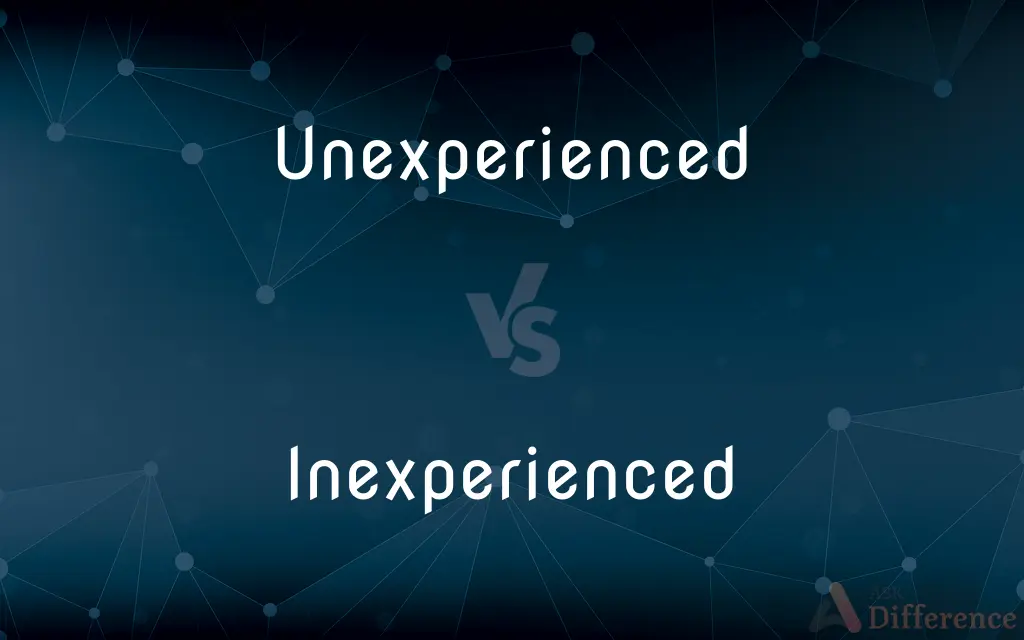Unexperienced vs. Inexperienced — What's the Difference?
By Urooj Arif & Maham Liaqat — Updated on March 15, 2024
"Inexperienced" refers to lacking experience, while "unexperienced" is less common and often considered nonstandard.

Difference Between Unexperienced and Inexperienced
Table of Contents
ADVERTISEMENT
Key Differences
Inexperienced is a widely used term that describes someone who lacks experience in a particular area, skill, or field. It implies that the person has had little to no exposure or practice and therefore may not have the developed skills or knowledge that come with experience. Unexperienced, though it might occasionally be encountered, is not commonly used in standard English and may be considered incorrect in formal contexts. When it does appear, it tends to be used interchangeably with inexperienced to denote a lack of experience.
Both terms imply a need or opportunity for growth and learning. In contexts where learning and development are discussed, inexperienced is the preferred term to indicate that someone is at the beginning of their journey and has room to gain knowledge and skills.
The choice between these terms can also reflect nuances in perception; inexperienced has a neutral to mildly negative connotation, implying a normal part of learning or development, whereas unexperienced, due to its nonstandard nature, might draw attention in a way that distracts from the intended message.
Comparison Chart
Usage
Rare and often considered nonstandard.
Widely used and accepted as standard.
Connotation
May be viewed as incorrect in formal contexts.
Neutral to mildly negative, indicating a normal learning phase.
ADVERTISEMENT
Applicability
Interchangeable with inexperienced but less accepted.
Applies to a lack of experience in a skill, field, or activity.
Perceived Value
Can draw unwanted attention due to rarity.
Indicates potential for growth and learning.
Preferred Context
Generally discouraged in formal writing.
Preferred in professional, academic, and everyday contexts.
Compare with Definitions
Unexperienced
Not commonly used to describe a lack of experience.
She felt unexperienced and cautious about taking on the new project.
Inexperienced
Lacking experience in a particular field or activity.
The inexperienced volunteer eagerly learned from the seasoned professionals.
Unexperienced
Sometimes seen as a less standard variant of inexperienced.
His unexperienced approach was noticeable in the way he managed the team.
Inexperienced
Commonly used in professional and academic contexts.
The study was conducted by a group of inexperienced researchers.
Unexperienced
May be considered incorrect or a mistake in formal contexts.
The editor suggested replacing unexperienced with inexperienced for clarity.
Inexperienced
Indicates an early stage in professional development or learning.
Despite being inexperienced, the intern showed great potential.
Unexperienced
Not widely accepted in standard English usage.
The term unexperienced appeared in an early draft but was later corrected.
Inexperienced
Widely accepted and understood in English.
The job posting specified that even inexperienced candidates were welcome to apply.
Unexperienced
Rarely used in professional or academic writing.
The review pointed out the unexperienced nature of the study's methodology.
Inexperienced
Reflecting a need for growth and learning.
Her inexperienced yet enthusiastic attitude brought fresh energy to the team.
Unexperienced
Not experienced; not having acquired the requisite experience.
Inexperienced
Lack of experience.
Unexperienced
Not known by experience.
The team performed well even in unexperienced situations.
Inexperienced
Lack of the knowledge gained from experience.
Unexperienced
Not experienced; being without experience; inexperienced.
Inexperienced
Not experienced; lacking knowledge or experience; green.
Unexperienced
Untried; - applied to things.
Inexperienced
Not having experience; unskilled; naive.
Inexperienced
Lacking practical experience or training
Inexperienced
Lacking basic knowledge;
How can someone that age be so ignorant?
Inexperienced and new to the real world
Inexperienced
Lacking experience of life;
A callow youth of seventeen
Common Curiosities
What does inexperienced mean?
Inexperienced refers to lacking experience in a specific area or skill.
Is it wrong to use unexperienced?
While not technically wrong, unexperienced is less standard and may be viewed as a mistake in formal contexts.
Can inexperienced be a positive trait?
Being inexperienced is neutral and can be positive in contexts valuing learning and growth potential.
How can someone overcome being inexperienced?
Gaining experience through practice, education, and mentorship can help overcome inexperience.
Is being inexperienced the same as being unskilled?
Being inexperienced means lacking exposure or practice, while being unskilled refers to lacking specific abilities or expertise.
Can inexperience lead to innovation?
Inexperienced individuals can bring fresh perspectives and innovative ideas, not being constrained by conventional approaches.
Is unexperienced a real word?
While unexperienced can be understood, it's not commonly used and is often considered nonstandard.
Can volunteering help reduce inexperience?
Yes, volunteering is a valuable way to gain practical experience and skills in a particular field or activity.
Can you be inexperienced in personal relationships?
Yes, one can be inexperienced in personal relationships, reflecting a lack of exposure or practice in interpersonal dynamics.
Is there a way to gain experience quickly?
Immersive learning, taking on challenges, and seeking diverse opportunities can accelerate the acquisition of experience.
How do employers view inexperienced candidates?
Employers may view inexperienced candidates as having potential for growth, especially if they show eagerness to learn.
Do employers hire inexperienced workers?
Many employers are willing to hire inexperienced workers for roles where training is provided or potential is valued.
Does being inexperienced affect job prospects?
It can, depending on the job, but many employers offer entry-level positions designed for inexperienced candidates.
Is it common to feel inexperienced in a new job?
Yes, feeling inexperienced when starting a new job is common and part of the learning and adaptation process.
Do internships help with inexperience?
Internships are a great way to gain practical experience and reduce inexperience in a professional setting.
Share Your Discovery

Previous Comparison
Size vs. Scale
Next Comparison
Timetable vs. RosterAuthor Spotlight
Written by
Urooj ArifUrooj is a skilled content writer at Ask Difference, known for her exceptional ability to simplify complex topics into engaging and informative content. With a passion for research and a flair for clear, concise writing, she consistently delivers articles that resonate with our diverse audience.
Co-written by
Maham Liaqat













































